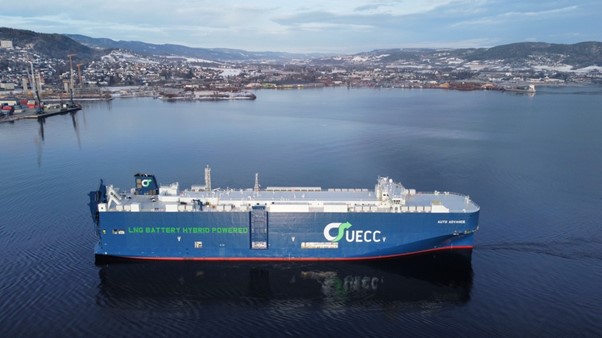The leading European sustainable shortsea carrier has made significant strides in decarbonisation of its fleet of pure car and truck carriers (PCTCs) with the addition of five LNG-fuelled newbuilds and the increased rollout of biofuels in recent years – and this is now showing commercial payback for clients in the light of new green regulations, according to Energy and Sustainability Manager Daniel Gent.
UECC boosted the use of ISCC-certified sustainable biofuel B100 on both owned and time-chartered ships to 14,000mt last year, up from 6500mt in 2022.
The company achieved a total tank-to-wake emissions reduction of over 60,000 tonnes across its 14-vessel fleet in 2023, of which it is estimated increased biofuel use accounted for 40,000 tonnes, with the remainder coming from LNG. This was a near-250% increase on the emissions cut of 24,200 tonnes achieved in 2022.
Positive EU ETS impact
“Consequently, we are well on the way to reach or exceed our 45% emissions reduction target by 2030. This clearly has a positive impact for those bio-supportive cargo owners in terms of reducing costs related to the EU Emissions Trading System (EU ETS),” Gent says.
“Furthermore, 85% of the vessels in our fleet achieved a C‑rating last year with the IMO’s Carbon Intensity Indicator (CII) and this year we expect all our ships to achieve this rating or above.”
Gent also points out the UECC fleet is already in surplus in relation to the requirement for an average 14.5% reduction in GHG intensity by 2035 under the FuelEU Maritime regulation due to be implemented next year.
The environmental performance of UECC’s current fleet of nine owned and five time-chartered PCTCs has been enhanced through delivery over the past seven years of five eco-friendly newbuilds – a pair of dual-fuelled LNG vessels and trio of multi-fuel LNG battery hybrid units.
The use of LNG reduces emissions of CO2 by around 25%, SOx and particulate matter by 90% and NOx by 85%, while the latest battery hybrid newbuilds exceed the IMO target to reduce carbon intensity by at least 40% from 2008 levels by 2030.
Pioneering alternative fuels
UECC is now looking at sourcing alternative carbon-neutral fuels such as bio-LNG and e‑LNG for these vessels to further improve their green performance, according to Gent.
UECC’s adoption of alternative fuels has expanded exponentially since the programme was launched in 2020 with piloting the use of biofuel on its vessel Autosky, bolstered by valuable support from owners of its time-chartered vessels, clients such as BMW, fuel suppliers like GoodFuels, industry partners, and parent companies NYK and Wallenius Lines.
“We are now in the fifth year of running our biofuels programme and it has gone from strength to strength. UECC has sought to take a leading role through early-stage analysis of new biofuels to evaluate their potential in terms of technical suitability, sustainability and commercial viability, both to deliver the best solution for our customers and give the sector a blueprint for assessment and adoption of such fuels based on these three pillars,” Gent explains.
He adds that, in terms of sustainability criteria, the company looks for biofuels with the biggest environmental impact, with a typical minimum 90% reduction in GHG intensity from well-to-wake compared with conventional marine fuels.
Paving way for decarbonisation
UECC has steadily expanded the use of green fuels to cover 30% of its fleet in 2023, up from 18% in 2022, and is on track to achieve 50% coverage this year towards the goal of 80% by 2030, though Gent is confident of surpassing this figure.
He says being proactive in trialling new alternative fuels has also promoted engagement with fuel providers, which has led to UECC’s latest initiative together with biofuel supplier ACT Group as part of an industry collaboration to test the Cashew Nut Shell Liquid (CNSL)-based biofuel FS.100 that he believes has “great potential for sustainable shipping”.
“Increasing the pool of sustainable drop-in fuels offers a pathway for shipping to achieve rapid emissions cuts on existing vessels. Combining alternative fuels with energy efficiency measures such as hull cleaning and electrification with shore power can further accelerate decarbonisation,” Gent says.
“By progressively advancing the use of alternative fuels, we are reducing emissions exposure for our clients and securing regulatory compliance long into the future, while also promoting industry efforts to reach the net-zero goal,” he concludes.

